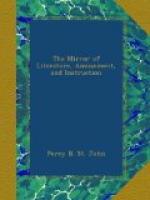The above vignette represents a Cromleh at Plas Newydd, the seat of the Marquess of Anglesea, in the Isle of Anglesea. This part of the island is finely wooded, and forcibly recalls to the mind its ancient state, when it was the celebrated seat of the Druids, the terrific rites of whose religion were performed in the gloom of the thickest groves.
The Cromleh at Plas Newydd is 12 feet 9 inches long, and 13 feet 2 inches broad, in the broadest part. Its greatest depth or thickness is 5 feet. Its contents cannot be less in cubic feet and decimal parts than 392,878,125. It follows, therefore, from calculating according to the specific gravity of stone of its kind, that it cannot weigh less than 30 tons 7 hundreds. The engraving is copied from “The Celtic Druids,” by Godfrey Higgins, Esq. F.S.A. 4to, 1827, one of the most valuable antiquarian volumes it has ever been our good fortune to secure; and by the aid of an esteemed correspondent, we hope shortly to introduce a few of its curiosities more in detail than we are enabled to do at present.
* * * * *
NOTES OF A READER.
WOMAN AND SONG.
(From a graceful little volume, entitled, “Poetical Recreations,” by C.A. Hulbert.)
Oh, who shall say that woman’s ear
Thrills to the minstrel’s
voice in vain?
She hath a balm diffusing tear,
She hath a softer, holier
strain—
A cheering smile of hope to give,
A voice to bid the mourner live.
She hath a milder beam of praise,
Her heart a soil where Truth
may bloom,
And while her drooping flowers we raise,
They yield us back a rich
perfume.
Her influence bids our talents rise
’Neath Love and Fancy’s native
skies!
I heard an infant’s lisping tongue
Address his mother’s
smiling eye,
And fondly ask his favourite song—
His soul seemed wrapt in harmony;
She sung—and gave the cheering
kiss,
Which made the poet’s fortune his.
His mother saw his fancies stray
To fragrant poesy, and leave
The dull pursuit of fortune’s way,
’Till some would chide
and others grieve;
But she had marked the rising flame,
And led and nourish’d it to fame!
When verse his mind to writing bore,
And genius shed its lustre
there,
How proudly did she con it o’er,
Unconscious fell the blissful
tear:
’Twas her’s to lighten care’s
control,
And raise the drooping, pensive soul.
Her labour past, another breast,
Still lovely woman’s,
urged his pen—
Pure love was sent to make him blest,
And bid his fancies flow again:
She yielded to his minstrel pride
The heart, the hand to lips denied!
Quick roll’d the years in tranquil
peace,
The peace by harmony begun.
And numbers charm’d each day of
bliss,
That flowing verse and concord
won:
His Mary’s music soothed his woe,
And chased the tear that chanced to flow.




